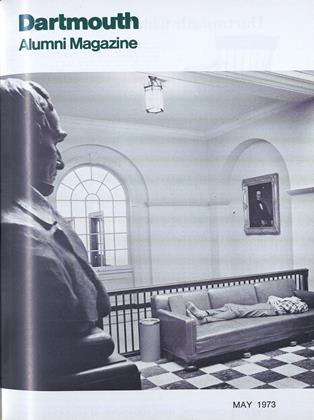By John A.Robertson '60 and Norman E. Zinberg. NewYork: Simon and Schuster, 1972. Paperbound.288 pp. $2.95. Cloth $8.95
The unhappy state of our law on drug use reflects a condition of public opinion. Our authors find that, despite sore need, most people are not open to argument or even to fresh facts on the subject. Can this stalemate be broken? The authors try.
In examining public attitudes the authors take a functional approach: "The central orientation of functionalism is to interpret data by establishing the consequences of an action or a situation for the larger structures with which it interacts. We call an item of human experience functional if it defines a mode of response that is governed by a given social unit, whether an individual, a group, or a culture." This language seems not aimed at those old grads who made it on gentlemen's C's. Yet read on. Simon and Schuster had their reasons for issuing the book in paperback. The subject is a hot one. Everybody cares. Functionalism? The approach is a cool one, characterized by skepticism. "Every item," say the authors, "has both manifest and latent functions. A manifest function of the argument against drug use is to establish that it is a public health hazard ... , a latent function is to exercise control over the threateningly ebullient younger generation."
Considerable work and study enhance the learned authors' experience. They interviewed 645 people in Britain and America over a period of six years. They favor innovative experimental steps based upon politically healthy agreement, looking toward a continuing reassessment of controls as new evidence is obtained.
Many areas are illuminated. Reaction to a drug depends not only upon the pharmacological effect but upon the users' "set" (his personality and expectation) and the "setting" or total environment. A change in social attitudes and law as to a drug might well have dramatically beneficial effects on the personality development of its users. The history of drug research is critically set forth, with a vote against awaiting the elusive "final verdict." A chapter on the British experience with treating addiction as illness, not crime, reports that it has survived mistakes. Two chapters analyze the structure and function of drug laws and their often disproportionate social costs. Finally, alternatives in drug control are assessed, with a preference for a licensing system. The approach remains thoughtful, consonant with a modestly expressed aim to stimulate rather than convince. Professor John Kaplan of Stanford Law School (whose leading work in this area, Marijuana - The NewProhibition, persuades Bill Buckley to urge decriminalization of pot use) calls this book a "must for anyone interested in what will be a major domestic issue in the years to come."
Mr. Sylvester. New York State AssistantAttorney General, is a son-in-law of Laurence H.Bankart '10.
 View Full Issue
View Full Issue
More From This Issue
-
 Feature
FeatureWhat's So New About It?
May 1973 By Joanna Sternick, A.M. '72 -
 Feature
FeatureLAND OF LOVE
May 1973 By Ralph J. Fletcher '75 -
 Feature
FeatureSCOPE: Off-Campus Options Made Easier
May 1973 By MARY ROSS -
 Article
ArticleThe Indian Yell Revisited
May 1973 By Russell O. Ayers '29 -
 Article
ArticleFaculty
May 1973 By ROBERT B. GRAHAM '40 -
 Article
ArticleHis Own Man
May 1973 By DERO A. SAUNDERS '35
MURRAY SYLVESTER
Books
-
 Books
BooksFACULTY PUBLICATIONS
April, 1923 -
 Books
BooksRAMBLING WITH GAMBLING.
JANUARY 1973 By DENNIS A. DINAN '61 -
 Books
BooksWhich Came First?
March 1976 By NOEL PERRIN -
 Books
BooksCliff-Hanger
June 1980 By Peter D. Smith -
 Books
BooksORBITER DICTA: OPINIONS, JUDICIOUS AND OTHERWISE, ON LAWYERS AND THE LAW.
JULY 1971 By ROBERT L. LOEB '21 -
 Books
BooksALUMNI PUBLICATIONS WHAT MAKES SAMMY RUN
April 1941 By Sidney Cox




